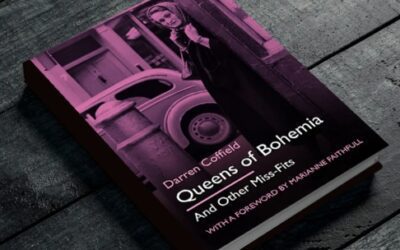As the colder months draw in there is a temptation to wrap yourself in comfy nostalgia classics and forget about the storm outside. Quiet nights with Graham Nash, Joni Mitchell, Nick Drake and their generational descendants du jour send you heading backwards into Hank Williams, Blind Willie McTell and Dock Boggs, with a soft left looking for musical archaeologists like Heilung or Current 93.
It’s not that this is a bad thing, but there must be more to music than the constant retread of paths you’ve walked for several winters. It’s time to forge new ways through the wilderness and, while locked down, pursue the better nature of your listening life. Go weird and go where it is uncomfortable, where even the idea of appreciation is surrendered while you try to work out what it is you’re hearing. This is the sonic adventure you need to make, because the repetitious stuffing of aural cake has made your ears fat and senile. It’s time to remove the buds and put those holes to odd work.
The following incredible records are solitary treks into misty, uncomfortable wildernesses. You may set out underdressed and ill-prepared but it becomes natural when we realise we want it this way. There is something elemental here, an ordeal that we must traverse with little promise that within these blasted vistas some sort of wisdom will be uncovered. Our musical devices are summoned, drawn and seduced by the thrill of functional mystery.
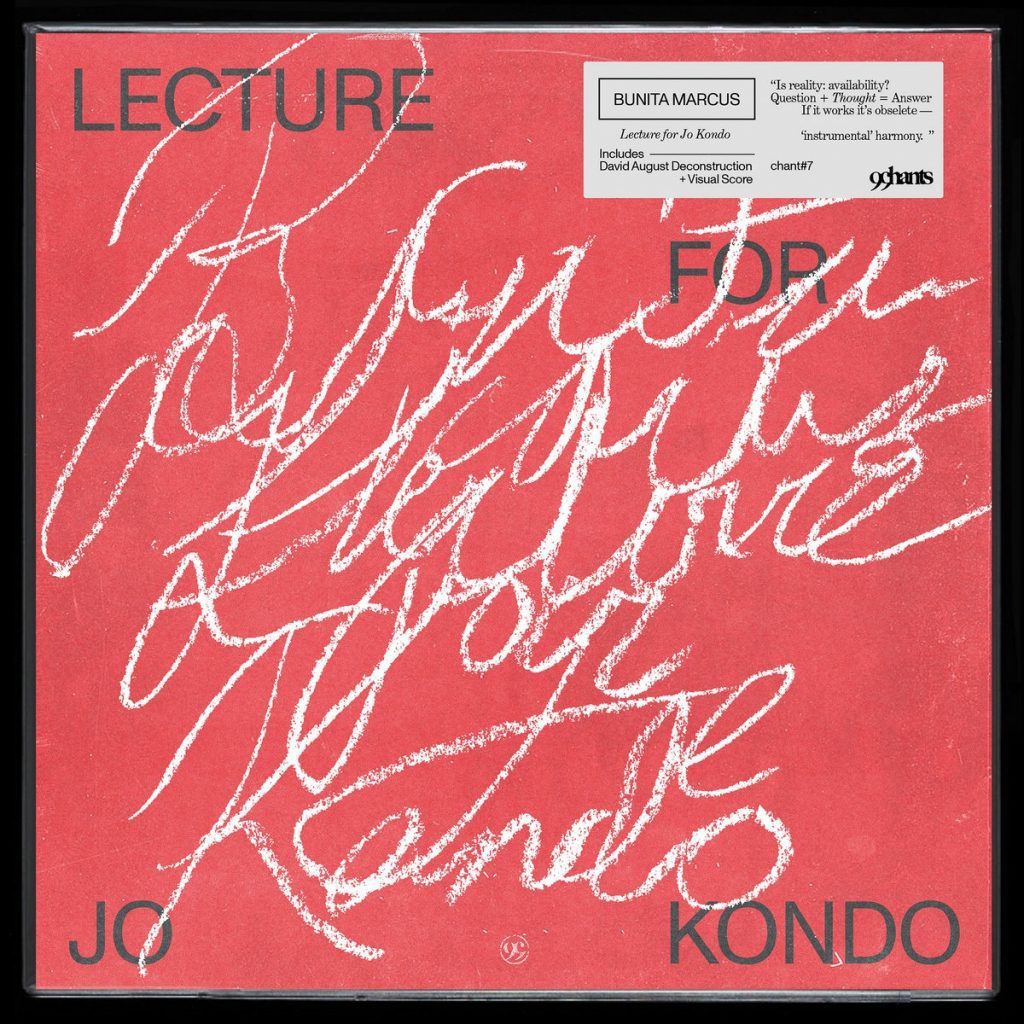
Listening to Bunita Marcus’ Lecture for Jo Kondo, you instantly recognise the onrush of a ‘profound experience’. Alternating between Marcus’ flat recitation of a poem and consonant tone figures, the experience quickly becomes meditative and ego-destroying. The musical figures are never the same but they don’t deviate far, and the entire experience feels deep and expansive, or as it says on the back of the album: Consonant not “tonal”, Reductive not minimal. We are trapped but sing in our chains.
Side one is a 2011 recording of Marcus’ 1985 piece as she intended, whereas side two is a reworking of the piece by Dave August, a masterful 2020 update replete with electronic flourishes and polyphonic augmentation. Then and now, this is a superlative experimental record that grabs you and keeps you transfixed. The forgettable history is that while Marcus was an influential contemporary alongside John Cage, Morton Feldman in the New York avant-classical scene of the 70s, she has been criminally overlooked until now. The real story is that where she strikes, the effect is resonant, moving and life-changing, as though the way you approach listening and sound has been altered.
Behind the compelling listening experience, Lecture for Jo Kondo claims to be one of the first works in the second half of the 20th century to use consonance that is not tonal. Notably, it explores serialism as an aspect of neuroscience. Says Marcus, “This is something that Jo and I had in common. This piece is based in complex theories I am calling ‘serialism’ and showing how repetition + mutation = patterning. It is this patterning that is the basis of musical language and thought.” There are many ways to listen to this record and it is probably the most complex musical experience this reviewer has experienced for a long time. You feel buoyed, awake and alive through every second. Diving between the liner notes, with the information pouring through your ears, this is an artistic experience that demands your time. Time, which is not just happily given, but gratefully received.
Lecture for Jo Kondo by Bunita Marcus is available via 99Chants now
Taking cues from the Bulgarian Women’s Choir, ambient noise and the electro-folk of Björk, Nereïd by experimental French artist Rïcïnn (Laure Le Prunenec) is a haunting lesson in technical vocalisation. Walking between strictly formal and wildly free composition, Prunenec’s chameleon-like voice provides a limitless variation of characters and tones. One moment she sounds like Björk (“Doris”), the next like a child, then something mechanical, and then similar to a woodwind instrument. If you’ve enjoyed the more difficult albums of Massive Attack and Portishead, there is a lot here to appreciate here. The panoramic composition style touches the same moments of bombast familiar to Mezzanine, to the extent that the one criticism is that it tends to stomp on the ‘unexpected epic operatic’ pedal a bit too much.
Does the album drift in progressive symphonic metal territory too many times? Almost, though not too badly. The thundering tom-tom builds and hands-in-the-air bass drops are laid on a bit thick, even though you know that in a live context it will be welcome. Familiar territory for fans of her work with Igorrr surely, though there is enough variation here to expand their listening and her audience.
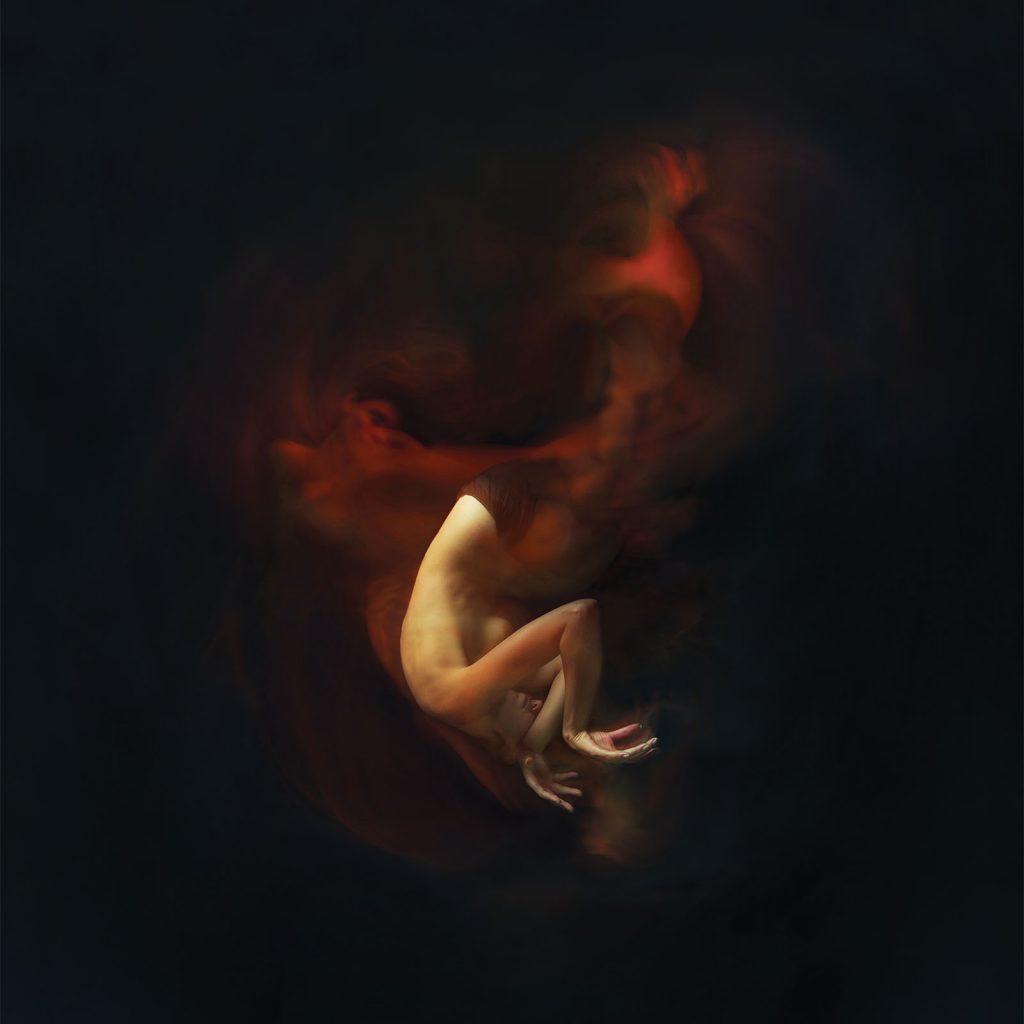
It’s hard to pin down what makes this album such a catchy listen. For its shrieks and ticks, soaring vocals and whimsy, its enigmatic polylingual quality transports you into a sort of Guillermo del Toro headspace of magical realism. One supposes, then, that the most uncomfortable thing about the album is that it is the best progressive rock album of the last five years. An often embarrassing genre, prog is reinvigorated on Nereïd. On each of these beguiling tracks, this talented and mysterious artist gives us reasons to both investigate outside of the confines of genre, and perhaps learn to listen without resorting to classifications.
Nereïd by Rïcïnn is available via Blood Music now
A prelude to rebellion? The current malaise of the world has more than a few overtones of the birth of punk, with the hovering threat of financial ruin circling many who are actively looking to re-evaluate their lives. Things certainly seem doom-laden enough to warrant it. But then things could be worse, and we could learn a bit from the struggles of our forebears, not least in resisting the urge to remain passive. So it is that this rare offering from Penny Rimbaud, co-founder of anarcho-punk outfit Crass, presents us with a highly original record. Arthur Rimbaud In Verdun sees Rimbaud imagining a young version of his namesake (Arthur Rimbaud) coming to terms with the horror and humanity of the first world war.
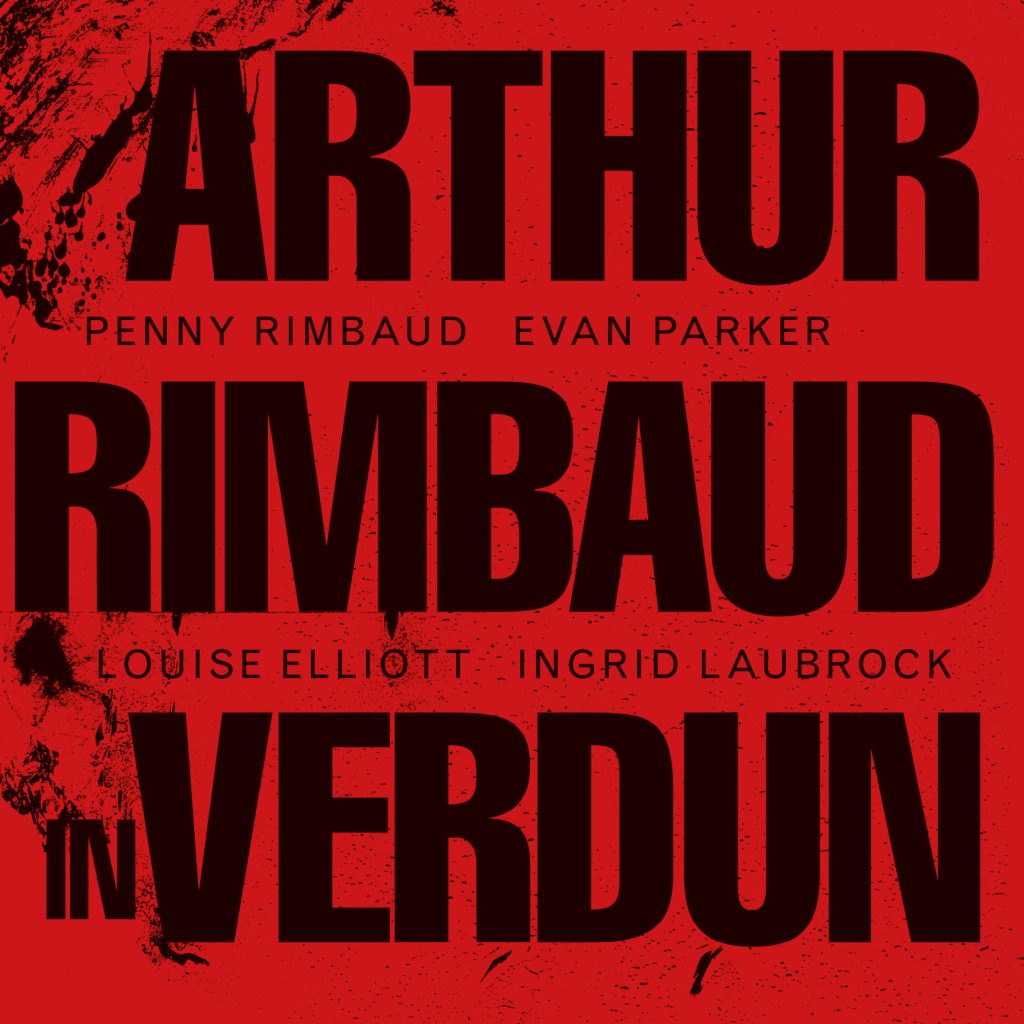
The musical accompaniment comes from noted jazz players Evan Parker, Louise Elliott and Ingrid Laubrock, whose improvisational free jazz wheels around Rimbaud’s puckish delivery, which ejaculates and punches out lines with energetic ferocity. On the surface the album is an almost comic reproduction of what people parody about beat-era jazz: no songs, thematic poetry riddled with expletives and entreaties to ‘live mutherfucker, live’, elitist musicianship which borders on the self-indulgent, and a delivery so unselfconscious that they don’t notice that it’s all really quite funny.
But for all the sneering and back-to-basics righteousness, what the knockers miss is that it is supposed to be fun, it’s supposed to be a blaring ‘boisterous’ charge against the ‘cloistered, clustered’ ways of hand-wringing a conformist identity out of underachievement. This album is a triumphant statement of wild and unfettered creative verve, and as such borders gloriously on the unlistenable. But persevere, and there are gems amongst the chaos. Much of the visions within the imagined Rimbaud come across as statements about contemporary life. The claims of punk and its ageing reality, consumerism, and society are topics about which he still has plenty to say.
The musical chaos and randomness that mark the first quarter of the album settle down around Part Three, as though it is a brutalising trial you must experience to reach the softer and more melodic sections. Senses thus excoriated, beautiful moments of poise, interplay and restraint become sweet and heart-lifting. Arthur Rimbaud in Verdun is a demanding listen that offers sincere payoffs where you least expect it.
Arthur Rimbaud In Verdun by Penny Rimbaud is out on 20 November via One Little Independent Records
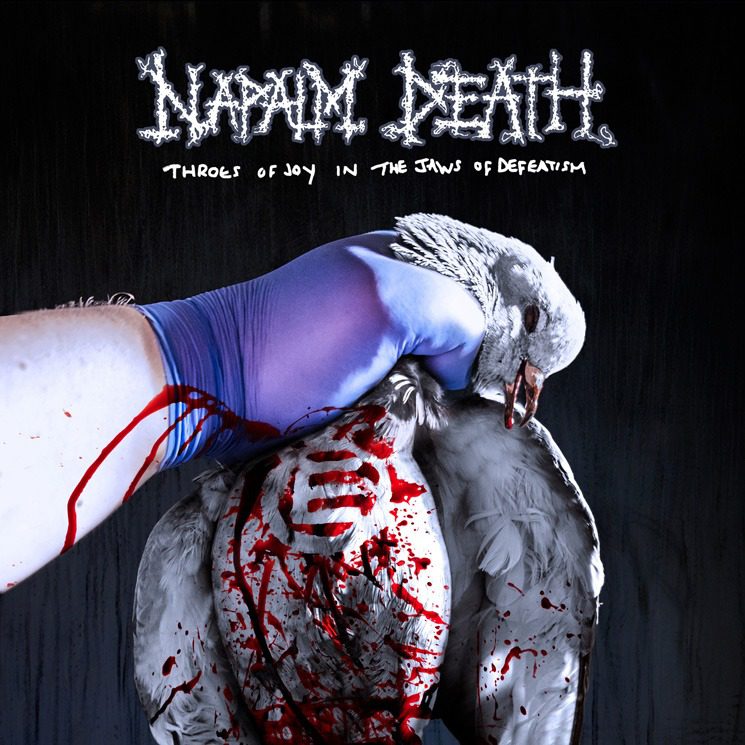
What then does one expect from Napalm Death? Undoubtedly a national treasure, how long until they are duly recognised? Shane Embury KBE has the right ring to it, don’t you think? Their latest album Throes of Joy in the Jaws of Defeatism is another step forward for t’Death — as no one calls them, though Urban Dictionary defines T-Death as a ‘hardcore drug made up of legal chemicals that contain testosterone, caffeine, vodka and bread’, which serves as a relatively apt definition of the Birmingham band, perhaps much of the UK too — as they evolve their form of grindcore against the grain, burrowing toward even more chthonic depths with each release. Emerging in 1981, they defined a punk-metal subgenre by eschewing melody for varying levels of percussive distortion, screamed vocals and staunchly left politics. Nearly 40 years later they’re hardly a country and western band but melody has crept in, though their sharpened approach never chugs directly; it shifts and weaves, flicking between noise, punk and indie. All the tracks here are box-fresh, innovative and on their terms it is hugely successful.
There is something fundamentally English about Napalm Death that feels unshakable, a cynicism, an anti-Thatcherite 2000 AD comic rage that harbours a killing joke, and the promise/threat of an English civil uprising for a more equitable classless society. All this is telegraphed to the listener via buzzsaw stop-start guitars, an inexplicably compelling rhythm section, barely intelligible vocals with highly coherent lyrics, and something more. Is it a lack of Americana that makes them so special? Bands like Cardiacs, XTC, Dizzee Rascal, Oysterband, Autechre and Napalm Death all started with a sense of the dreary, the smell of wet council concrete, the musk of improperly dried clothes suffused with rolling tobacco, restrained tears, window-shopping, ceilinged hope and bitter laughter. It’s all there on tracks “That Curse of Being in Thrall”, “Acting in Gouged Faith” and “Amoral”, and as the pummelling riffs rush over, you realise something else about Napalm Death. They are never pessimistic. Negative perhaps, but they never mope, they don’t even wish, as the album title suggests they move boldly forward.
According to Wikipedia, there was a turning point in the band’s history when rather than break up they made a conscious choice to avoid the musical clichés of heavy metal and remain sonically an underground UK act. This direction lends a sort of timeless presence to their music, simply because it plays against the common chord progressions and melodies our ears expect. Throes of Joy in the Jaws of Defeatism is an album that twists and turns while remaining a pure Napalm Death record. An achievement for any band but huge for a group with a 30+ year history. There might even be a warming thought about being yourself somewhere in there, but that is a bit sappy for what is a creative exploration of what all heavy music should achieve: a new perspective irresistibly argued with conviction.
Throes of Joy in the Jaws of Defeatism by Napalm Death is available now via Century Media
The final album in our uncomfortable music series is a much anticipated record from a caustically influential experimental rock outfit called Mr Bungle. After 15 years of deeply disturbing music they called it quits in 2000 following the release of their masterpiece California. That fascinating record combined surf-rock, exotica, lounge music, techno, jazz, zazz, and probably rebetiko to bend ears and spin minds sarcastically westward. All of which was lapped up by their rabid fanbase of Zappa cultists, muso freaks and the occasional mainstream tourist. However, being woeful cultural elitists (whaddaya mean you want repetition?), musical polymaths and humorously vulgar, their refusal to jack in with the 90s flannel decade ultimately laid the groundwork for their lack of mainstream appeal, mutual antipathy and eventual cessation.

Jump forward to 2019 years and they’re playing a few gigs in the States. People go crazy, tickets sell out in seconds, and then we hear a recording is in the works. Thank the lord our prayers are answered!
Some online fans speculate (rightly) that it’ll follow what was played at the gig, a reimagining of their teenage demo The Raging Wrath of the Easter Bunny. A period when Mr Bungle wasn’t explosively experimental nor globally influential but just a reasonably adept crossover thrash unit. So it is with the help of Scott Ian of Anthrax and Dave Lombardo of Slayer they have gone back to record those demos properly, to reimagine what might/should have been. The Internet jokingly claims that by doing this they’re essentially testing the patience of their gray fanbase and that there isn’t actually any reason for them to release this record. Possibly true, but the idea of a group of extremely accomplished musicians revisiting music they wrote as teens has a perverse appeal. Isn’t this the same as Nick Cave’s acclaimed Grinderman outfit which came from a similar impulse to go back to an earlier, more primal energy? Why shouldn’t veterans return to a stripped back creative process where the layers of experience and complex are shaved to a raw finish? Then again, Grinderman wrote new tunes… Mr Bungle, well what really is this new record?
Lockdown has been a time of introspection. Given four walls and an extended period of enclosure we have all asked ourselves how we’ve got here, perhaps even what if things had turned out differently. Do we get do-overs and if we do, are there are guarantees that things will turn out any better? The big ‘what-ifs’ in life rarely do much good; if we can get by without repeating the same mistakes we’re all doing well.
Listening to the original demo and the new recording side by side, the demo shines with a frenzied energy and beguiling charm that hasn’t quite been eclipsed by the polished new version. Trey Spruance’s solos were wilder, the dive bombs squealed louder, the runs deeper, the madness real. The ragged earlier performances shine with a cassette culture rawness that rings historic, where the new version feels mighty, competent, and modern. The fork in the road is when we ask where the most nostalgia lies, in lionising the limitations of the demo, or in a fresh retake of the past?
From a musical perspective, the new version is a far more favourable presentation of solid material from a band that would later make some truly stellar art. It’s fun to listen to but doesn’t tear at the fabric of reality like their Warner Brothers releases did. But to the band perhaps it means more, as bassist Trevor Dunn put it to Kerrang! “We were finally utilising our Ph.Ds in thrash metal. All we had to do was go back to our original professors for some additional guidance and talk them into joining us. Turns out we were A+ students… We were haunted for 35 years by the fact that this music wasn’t given its due respect. Now we can die.” That said, the band has never been above bullshitting either the press or their fans. In some ways it’s a very central tenet of the whole ride.
What is more uncomfortable than witnessing the ravaging passage of time? Very little, however despite the limitations there are ways to rage ecstatically and this record gives us eleven reasons to feel alive. The Raging Wrath of the Easter Bunny Demo is a brilliant comet of inward-looking madness which circles the past, reminds us how vital thrash could be and in the end stands as a better testament to the musical form than a 40-something reviewer’s overplayed cassette of remembrance.
Do we fear that this is another example of nostalgia marketing? Are we cannibalising history faster than we are producing it? Are we so short of ideas that we need a high-quality 80s thrash rehash? With the outrageous heft of talent in the reformed Mr Bungle, revisiting a 35-year-old set of participation trophies feels like the cheapest, most frivolous, self-aggrandising, bloated, and disposably pointless thing the band has ever done. But in our era of heavy foreboding, navel-gazing cancel culture, virtue-signalling, revisionist history and righteous sanctimony, reaching a new ecstatic low might be the ultimate badge of honour, a fresh breath of foul air. It’s high time to get exquisitely weird, defy expectation, and have some goddamn fun, and Mr Bungle does it again, again. En Shallah.
The Raging Wrath of The Easter Bunny Demo by Mr Bungle is out on 30 October via Ipecac Recordings
Interview with Trey Spruance from Mr Bungle/Secret Chiefs 3

Ex-London based reader of art and culture. Specialist subjects include; media, philosophy, cultural aesthetics, contemporary art and French wine. When not searching for road-worn copies of eighteenth-century travelogues he can be found loitering in the inspirational uplands of art galleries throughout Europe.















